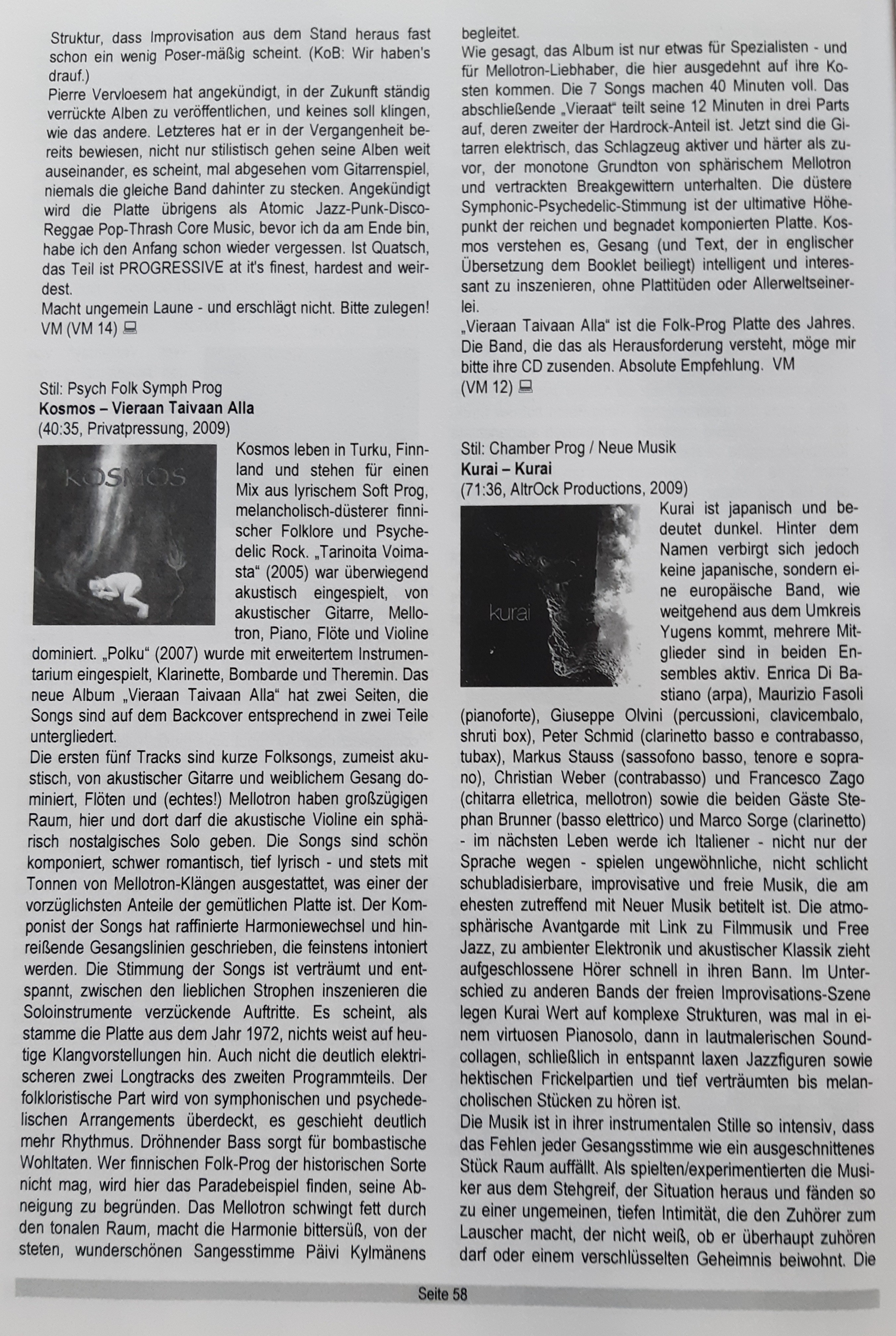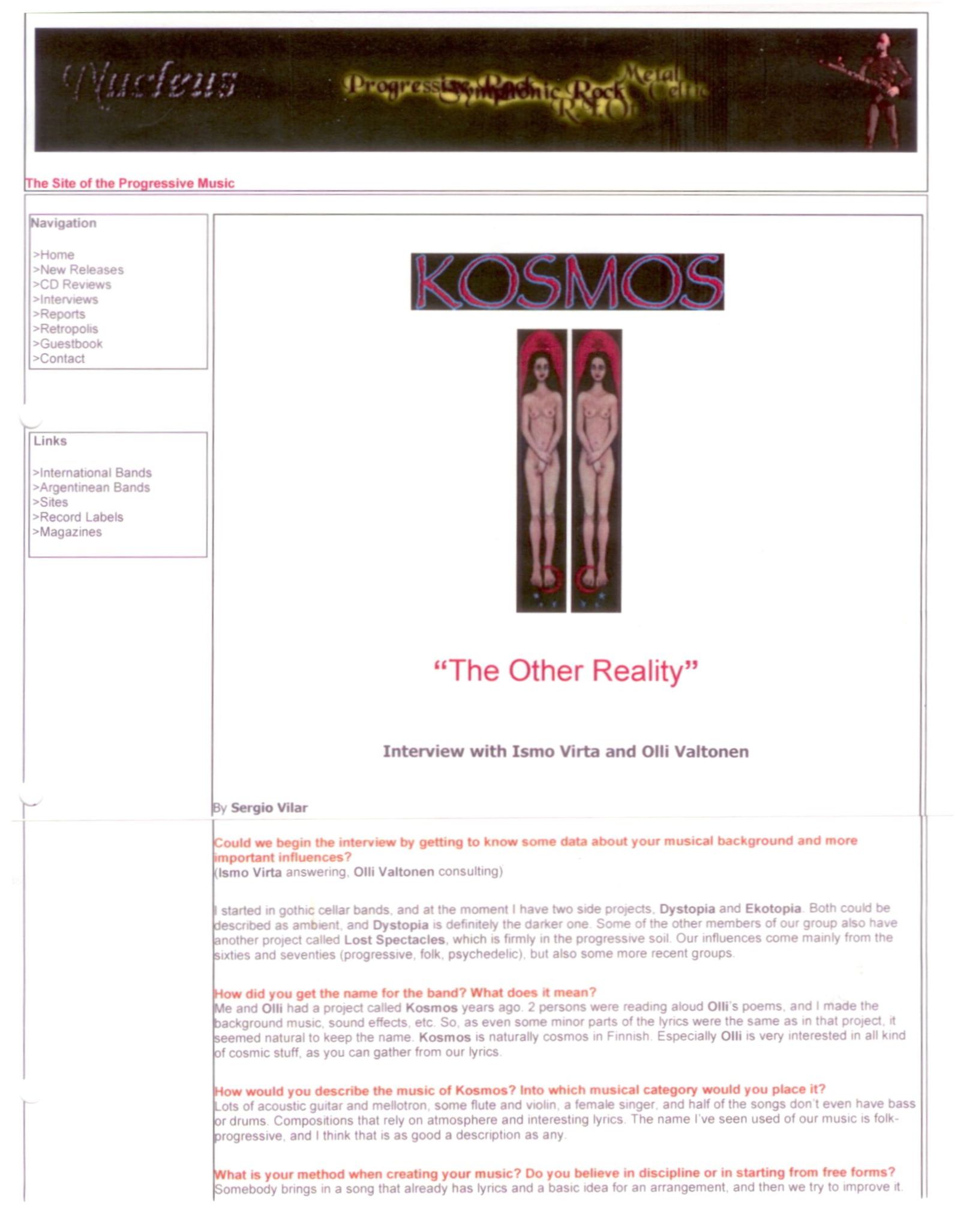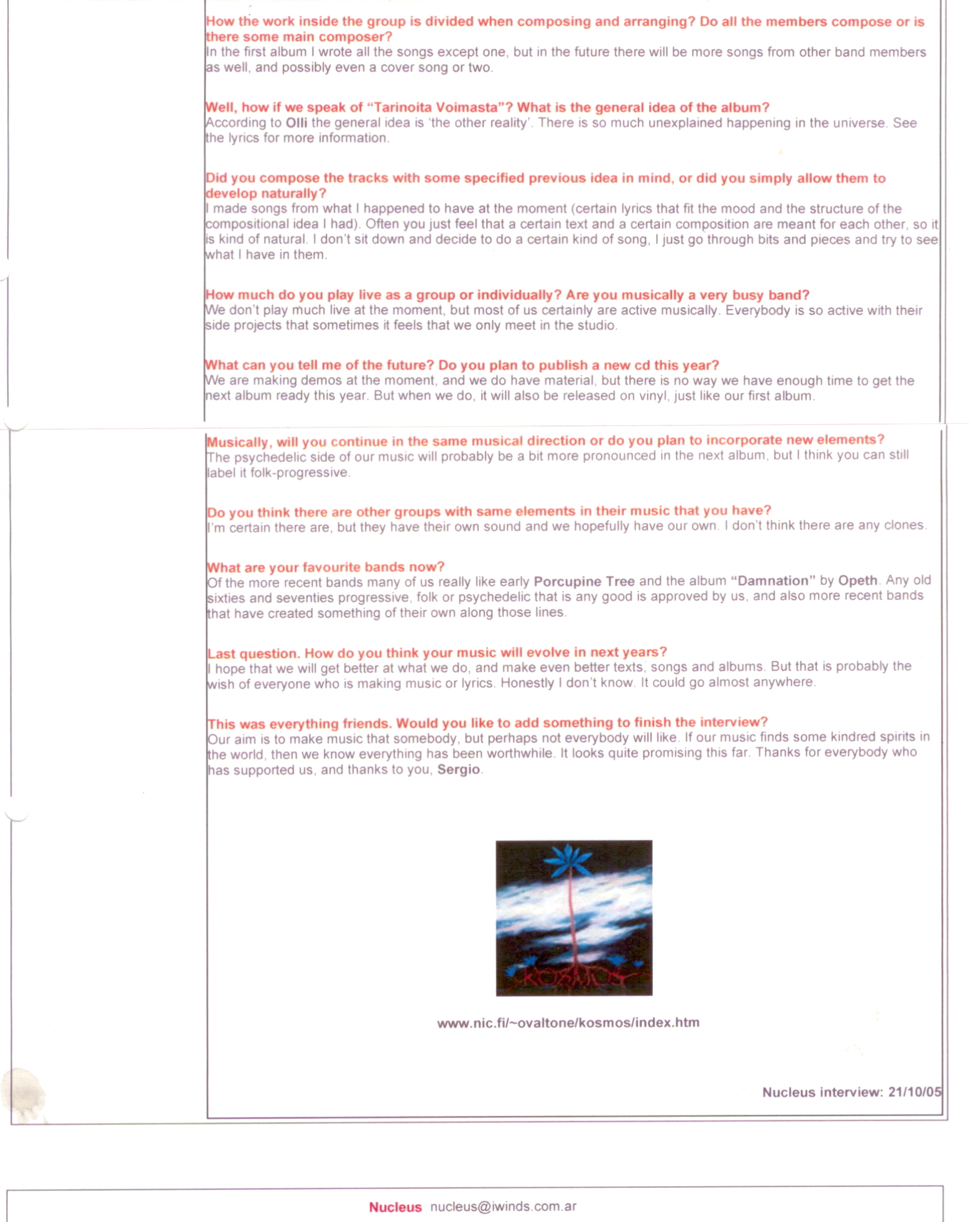
Uusimman projektimme "Tuuli käy lävitsein" video (alkuperäinen versio, 2023)
Uusimman projektimme "Inside (The Wind Has Blown)" video (englanninkielinen käännös, 2023)
Lizard Recordsin julkaisema video kappaleesta Minä olen – 26. kesäkuuta 2021
Prog Italia –lehtiartikkeli – maaliskuu 2020
Rockerilla –lehtiartikkeli – helmikuu 2021
Turun Sanomat –lehtiartikkeli – heinäkuu 2020
Progressive Newsletter –haastattelu – joulukuu 2013
Music Street Journal –haastattelu – 2013
Progressive Newsletter –levyarvostelu – 2009
Nucleus haastattelu – 21. lokakuuta 2005
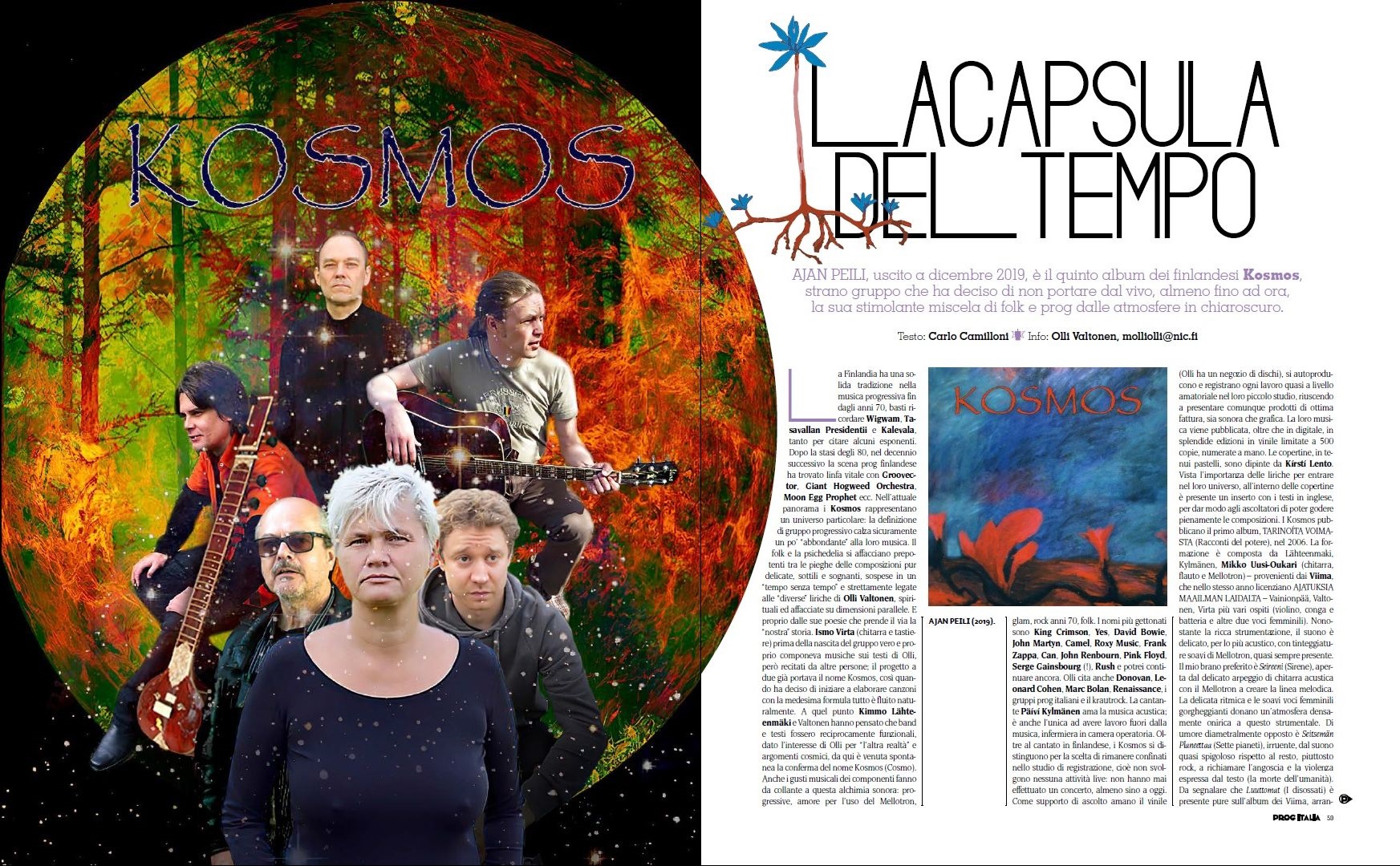
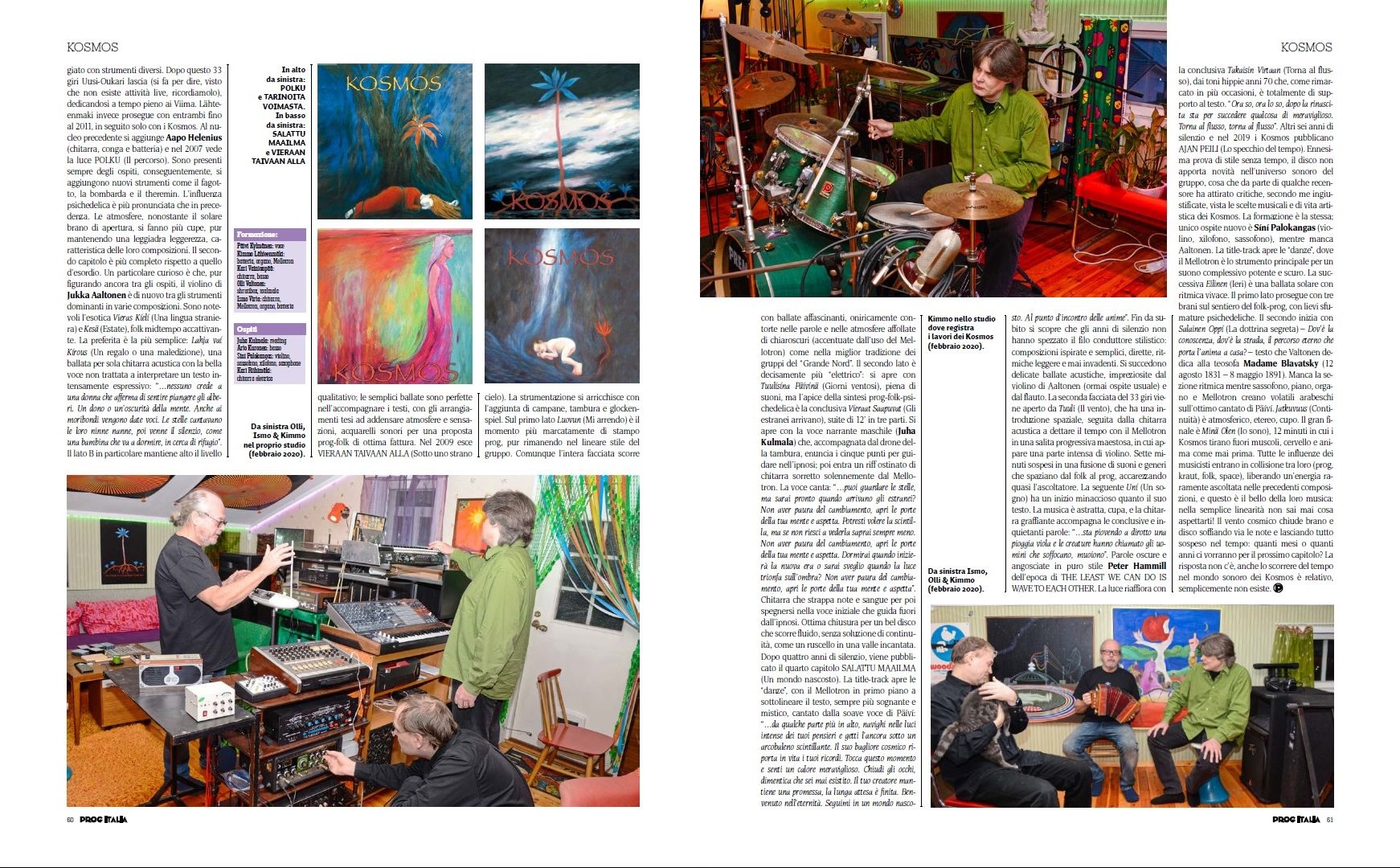
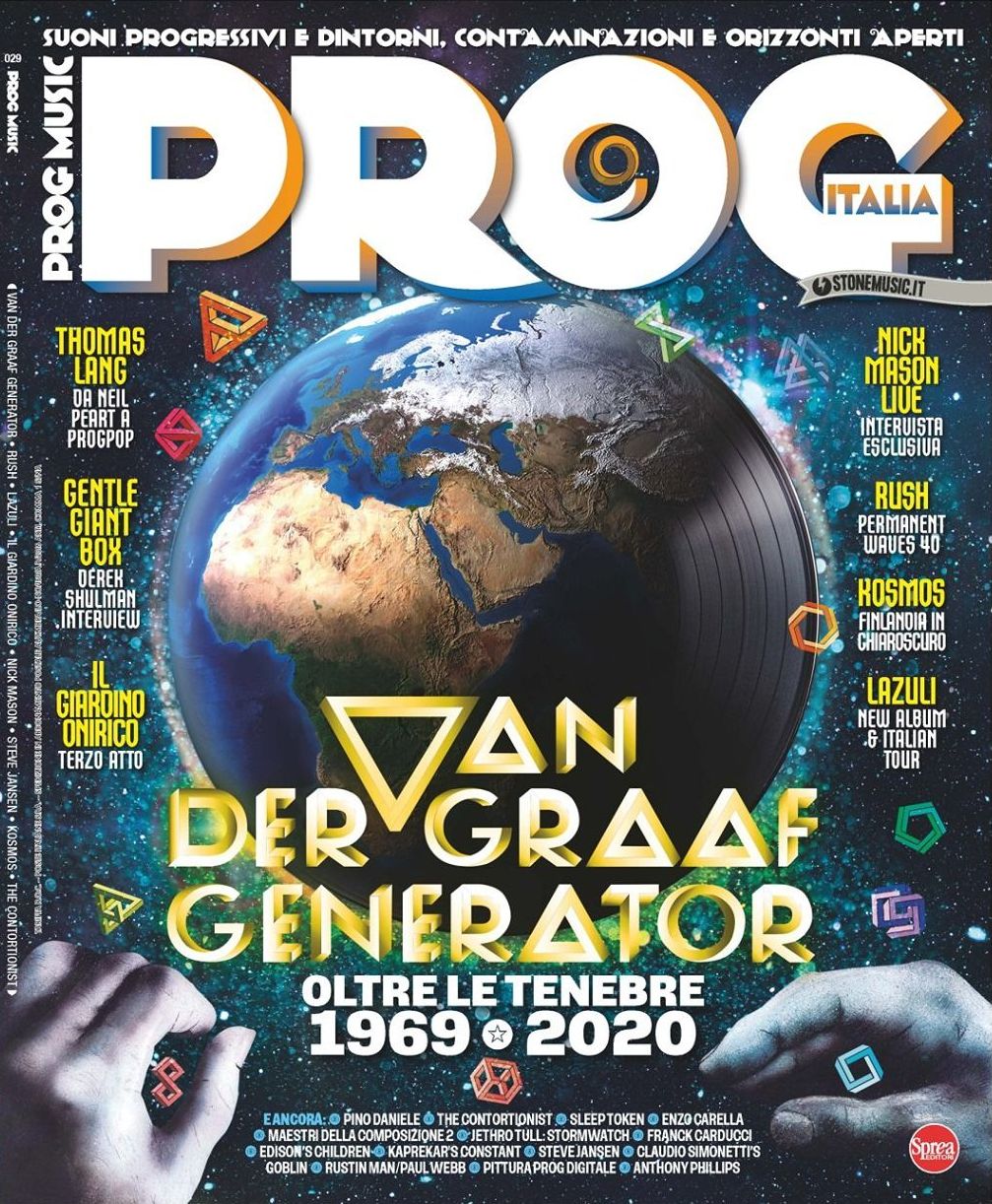
Englanninkielinen käännös artikkelista
The time capsule
AJAN PEILI, released in December 2019, is the fifth album by the Finnish Kosmos,
a strange group that has decided not to perform live, at least until now,
its stimulating mix of folk and prog with a chiaroscuro atmosphere.
Finland has a solid tradition in progressive music since the 70s, just remember Wigwam, Tasavallan Presidentii and Kalevala, just to mention a few exponents. After the stasis of the 80s, in the following decade the Finnish prog scene found lifeblood with Groovector, Giant Hogweed Orchestra, Moon Egg Prophet etc. In the current landscape, Kosmos represent a particular universe: the definition of progressive group certainly fits in a somewhat "abundant" way with their music. Folk and psychedelia dominate overbearing the folds of the compositions, though delicate, subtle and dreamy, suspended in a "timeless time" and closely linked to the "different" lyrics by Olli Valtonen, spiritual and facing parallel dimensions. It is precisely from his poems that the story we are about to tell starts. Before the birth of the group, Ismo Virta (guitar and keyboards) composed music on Olli's lyrics, however recited by other people; the project for two already bore the name Kosmos, so when he decided to start processing songs with the same formula everything flowed naturally. At that point Kimmo Lähteenmäki and Valtonen thought that bands and lyrics were mutually functional, given Olli's interest in "the other reality" and cosmic topics, the confirmation of the name Kosmos (Cosmo) came spontaneously from here. Even the musical tastes of the components act as a glue to this sound alchemy: progressive, love for the use of Mellotron, glam, 70s rock, folk. The most popular names are King Crimson, Yes, David Bowie, John Martyn, Camel, Roxy Music, Frank Zappa, Can, John Renbourn, Pink Floyd, Serge Gainsbourg (!), Rush and I could go on and on. Olli also mentions Donovan, Leonard Cohen, Marc Bolan, Renaissance, the Italian prog groups and krautrock. Singer Päivi Kylmänen loves acoustic music; she is also the only one to have work outside of music, a nurse in the operating room. In addition to singing in Finnish, Kosmos are distinguished by the choice to remain confined to the recording studio, that is, they do not perform any live activities: they have never performed a concert, at least until today. As a listening medium they love vinyl (Olli has a record shop), they self-produce and record every work almost at an amateur level in their small studio, still managing to present products of excellent workmanship, both sound and graphics. Their music is published, as well as digitally, in splendid vinyl editions limited to 500 copies, numbered by hand. The covers, in soft pastels, are painted by Kirsti Lento. Given the importance of the lyrics to enter their universe, inside the covers there is an insert with the lyrics in English, to allow listeners to fully enjoy the compositions.
Kosmos released their first album, TARINOiTA VOIMASTA (Tales of Power), in 2006. The line-up was made up of Lähteenmaki, Kylmänen, Mikko Uusi-Oukari (guitar, flute and Mellotron) - from Viima, who in the same year fired AJATUKSIA MAAILMAN LAIDALTA - Vainionpää, Valtonen, Virta plus various guests (violin, conga and drums and two other female voices). Despite the rich instrumentation, the sound is delicate, mostly acoustic, with soft colors of Mellotron, almost always present. My favorite song is Seireeni (Sirene), opened by the delicate acoustic guitar arpeggio with the Mellotron to create the melodic line. The delicate rhythm and the gentle female warbling voices give a densely dreamlike atmosphere to this instrumental. In a diametrically opposite mood is Seitsemän Planeettaa (Seven Planets), impetuous, with an almost angular sound compared to the rest, rather rock, to recall the anguish and violence expressed by the text (the death of humanity). It should be noted that Luuttomat (Boneless) is also present on the Viima album, arranged with different instruments. After this 33 laps Uusi-Oukari leaves (so to speak, since there is no live activity, remember), dedicating himself full time to the Viima. Lähteenmaki instead continues with both until 2011, then only with Kosmos.
To the previous core is added Aapo Helenius (guitar, conga and drums) and in 2007 POLKU (The path) is born. There are always guests, consequently new instruments are added such as the bassoon, the bombarda and the theremin. Psychedelic influence is more pronounced than previously. The atmospheres, despite the sunny opening song, become darker, while maintaining a graceful lightness, characteristic of their compositions. The second chapter is more complete than the first one. A curious detail is that, while still appearing among the guests, Jukka Aaltonen's violin is again among the dominant instruments in various compositions. The exotic Vieras Kieli (A foreign language) and Kesä (Summer) are noteworthy, captivating midtempo folk. The favorite is the simplest: Lahja vai Kirous (A gift or a curse), a ballad for acoustic guitar only with a beautiful untreated voice to interpret an intensely expressive text: ". nobody believes a woman who claims to hear him cry trees. A gift or darkness of the mind. Voices are also given to the dying. The stars sang their lullabies, then silence came, like a little girl going to sleep, looking for refuge. " Side B in particular keeps the quality level high; simple ballads are perfect in accompanying texts, with arrangements aimed at thickening atmospheres and sensations, sound watercolors for a prog-folk proposal of excellent workmanship.
In 2009 VIERAAN TAIVAAN ALLA was released (Under a strange sky). The instrumentation is enriched with the addition of bells, drum and glockenspiel. On the first side Luovun (I give up) is the most markedly prog moment, while remaining in the linear style of the group. However, the entire facade flows with fascinating ballads, dreamily twisted in words and atmospheres crowded with chiaroscuro (accentuated by the use of Mellotron) as in the best tradition of the groups of the "Great North". The second side is decidedly more "electric": it opens with Tuulisina Päivinä (Windy days), full of sounds, but the climax of the prog-folk-psychedelic synthesis is the conclusive Vieraat Saapuvat (Strangers arrive), suite of 12 ' in three parts. It opens with the male narrative voice (Juha Kulmala) which, accompanied by the drone of the drum, states the five points to guide in hypnosis; then a stubborn guitar riff enters solemnly supported by Mellotron. The voice sings: "... you can look at the stars, but will you be ready when strangers arrive? Don't be afraid of change, open the doors of your mind and wait. You may want the spark, but if you can't see it you will know less and less. Don't be afraid of change, open the doors of your mind and wait. Will you sleep when the new era begins or will you be awake when the light triumphs over the shadow? Don't be afraid of change, open the doors of your mind and wait. " Guitar that tears notes and blood and then goes out in the initial voice that guides you out of hypnosis. Excellent closure for a nice disc that flows fluid, seamlessly, like a stream in an enchanted valley.
After four years of silence, the fourth chapter SALATTU MAAILMA (A hidden world) is published. The song of the same name opens the "dances", with the Mellotron in the foreground emphasizing the text, ever more dreamy and mystical, sung by the gentle voice of Päivi: "... somewhere higher, you navigate in the intense lights of your thoughts and drop the anchor under a sparkling rainbow. Its cosmic glow brings your memories back to life. Touch this moment and feel a wonderful warmth. Close your eyes, forget that you never existed. Your creator keeps a promise, the long wait is over. Welcome to eternity. Follow me in a hidden world. At the meeting point of souls ". Right from the start it turns out that the years of silence have not broken the stylistic thread: inspired and simple compositions, direct, light rhythms and never intrusive. Delicate acoustic ballads follow each other, enhanced by Aaltonen's violin (now a regular guest) and by the flute. The second façade of 33 rpm is opened by Tuuli (Il vento), which has a spatial introduction, followed by the acoustic guitar to dictate the time with the Mellotron in a majestic progressive ascent, in which an intense violin part appears. Seven minutes suspended in a fusion of sounds and genres ranging from folk to prog, almost caressing the listener. The following Uni (A Dream) has a beginning as threatening as its text. The music is abstract, gloomy, and the scratching guitar accompanies the conclusive and disturbing words: "... a purple rain is pouring down and the creatures have called the men who suffocate, die". Dark and anguished words in pure Peter Hammill style from the era of THE LEAST WE CAN DO IS WAVE TO EACH OTHER. The light resurfaces with the final Takaisin Virtaan (Back to the flow), with hippie tones from the 70s which, as noted on several occasions, is totally supportive of the text. "Now I know, now I know, after the rebirth something wonderful is going to happen. Go back to the flow, go back to the flow ".
Another six years of silence and in 2019 the Kosmos publish AJAN PEILI (The mirror of time). Yet another test of timeless style, the disc does not bring anything new to the group's sound universe, which by some reviewers has attracted criticisms, which I believe are unjustified, given the Kosmos' musical and artistic life choices. Composition is the same; the only new guest is Sini Palokangas (violin, xylophone, saxophone), while Aaltonen is missing. The title track opens the "dances", where the Mellotron is the main instrument for a powerful and dark overall sound. The next Eilinen (Yesterday) is a sunny ballad with a lively rhythm. The first side continues with three tracks on the path of folk-prog, with slight psychedelic nuances. The second begins with Salainen Oppi (The Secret Doctrine) - Where is knowledge, where is the road, the eternal path that brings the soul home? - text that Valtonen dedicates to the theosophist Madame Blavatsky (12 August 1831 - 8 May 1891). The rhythm section is missing while saxophone, piano, organ and Mellotron create arabesque birds on the excellent singing of Päivi. Jatkuvuus (Continuity) is atmospheric, ethereal, gloomy. The grand finale is Minä Olen (I am), 12 minutes in which the Kosmos bring out muscles, brain and soul like never before. All the influences of the musicians collide with each other (prog, kraut, folk, space), releasing an energy rarely heard in previous compositions, and this is the beauty of their music: in simple linearity you never know what to expect! The cosmic wind closes the piece and disc blowing the notes away and leaving everything suspended in time: how many months or how many years will it take for the next chapter? There is no answer, even the passage of time in the sound world of Kosmos is relative, it simply does not exist.
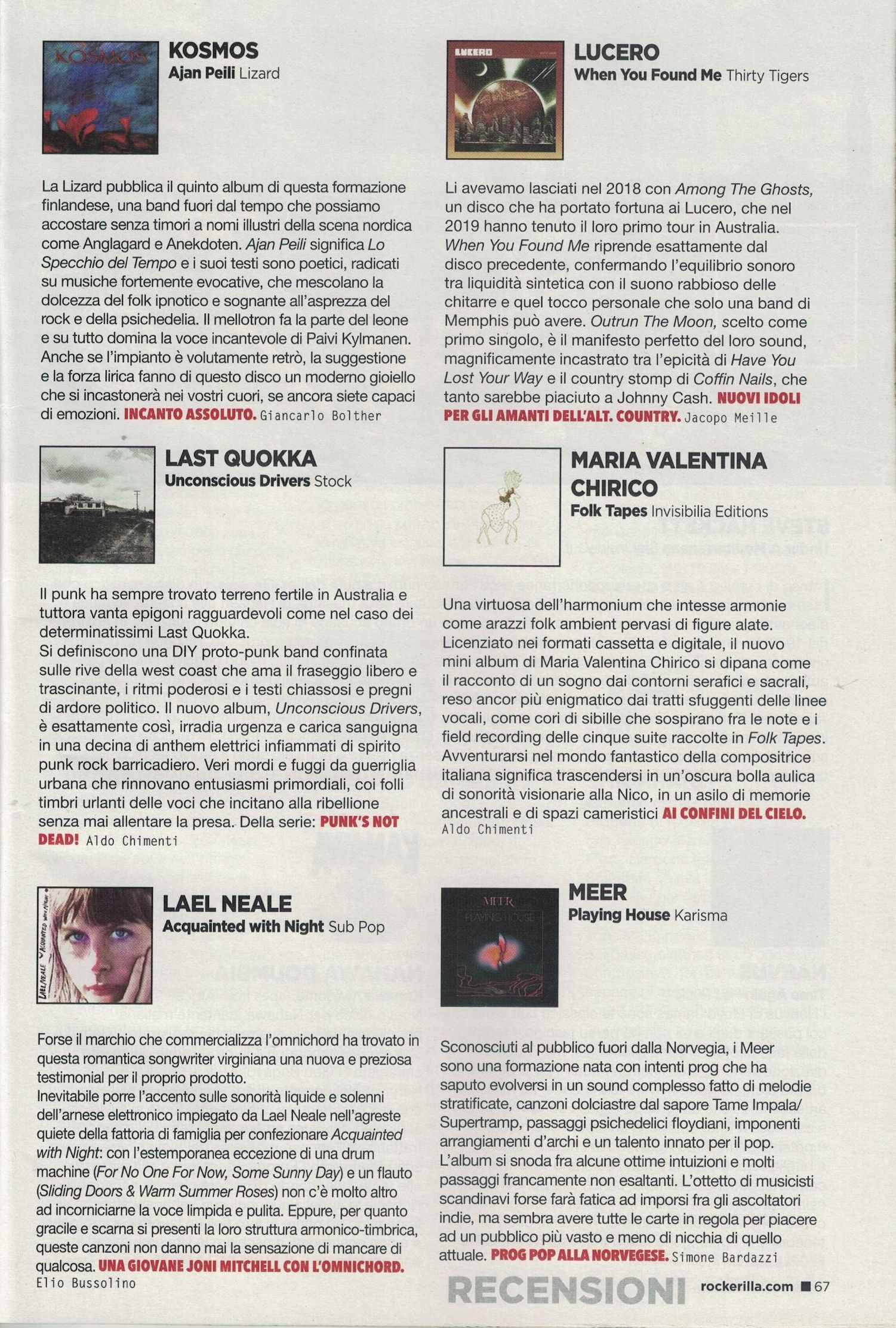
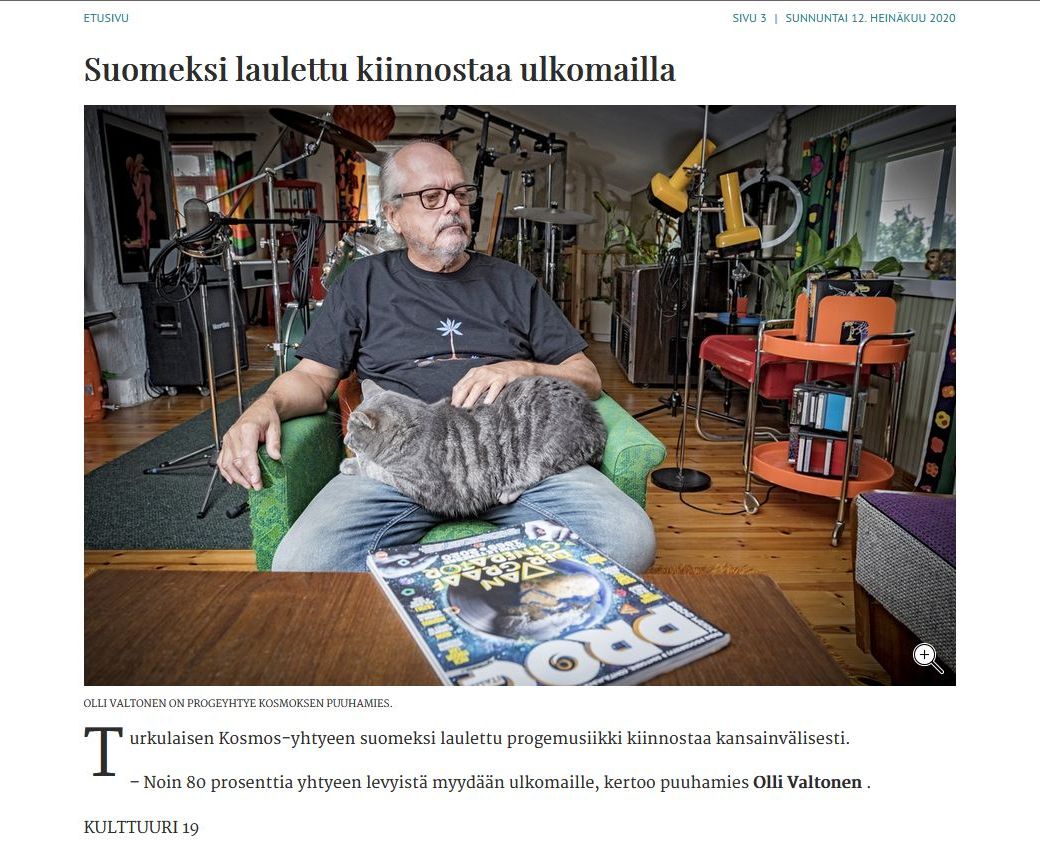
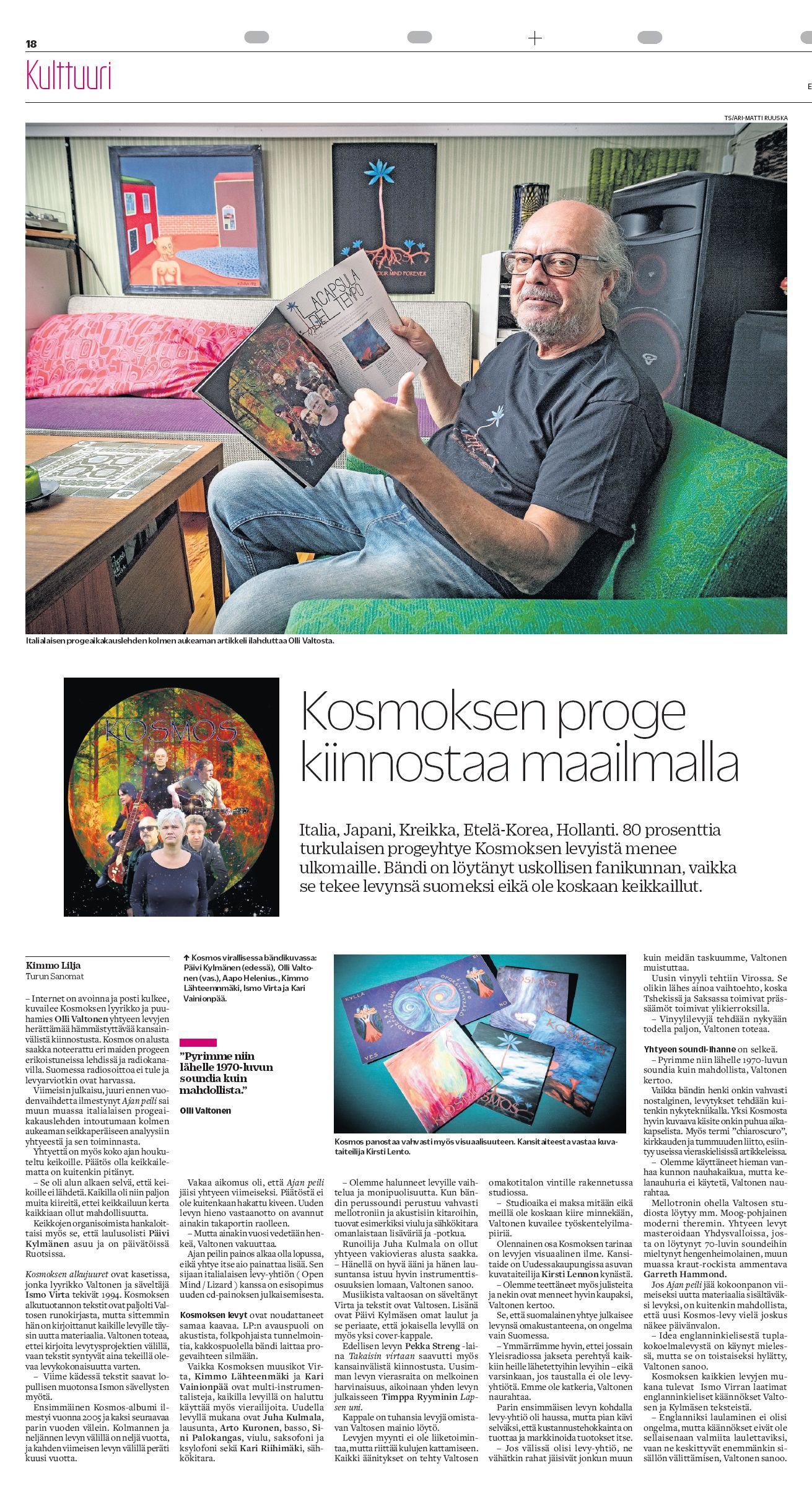
Progressive Newsletter – haastattelu

Progressive Newsletter – levyarvostelu
